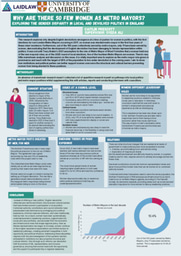Why are there so few women as metro mayors? Laidlaw Research Project
This project aimed to explore why so few of the metro mayors in England have been women, despite devolution occurring at a time where there was a concerted push for increasing the representation of women within politics. Metro mayors, and English devolution more broadly, remains a new and under-researched area, particularly regarding gender disparities. This project looks to address that research gap by analysing the causes of this underrepresentation and to put forward possible solutions to reduce the gender disparity within local politics.
This research highlights how devolution has failed at multiple stages to be a process that is fair and representative for women; even as representation is finally increasing, trends regarding expected experience continue to exclude women from a political system built by and for men. These ‘New Politics’ institutions have reflected and reinforced structural and cultural barriers at a council level whilst overlooking women’s inclusion in their creation. The set up of devolved institutions fostered an environment in which no woman was elected as metro mayor until 2021. Combined authority boards also resisted attempts to rebalance these gender divides, both the product and the tool of a culture in local politics that deprioritises the fair representation of women.
Addressing these issues require an acknowledgement of the systemic barriers embedded in devolved institutions but also proactive structural and cultural reforms to tackle the widespread underrepresentation of women in devolved politics. Bold reforms at both a council and devolved levels are needed if metro mayorships are to fulfil their democratic promise of fair, representative, and inclusive governance.

Please sign in
If you are a registered user on Laidlaw Scholars Network, please sign in